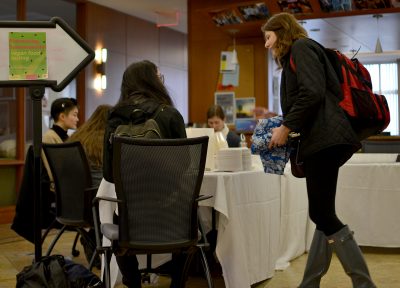
A vegan diet may appear daunting to college students on restrictive budgets and meal plans, and a meatless lifestyle may also appear like a future full of tasteless recipes.
But a vegan diet provides more than health benefits. In a 2015 study by the Journal of Cleaner Production, researchers found that vegan diets hold the potential to reduce carbon and other greenhouse gas emissions by up to 50 percent, particularly in areas with more development and economic affluence, such as cities like Boston.
The switch may seem daunting, but Boston University’s Global Environmental Brigades, along with the Earth House living-learning community and BU’s Hillel Foundation, hosted a vegan food tasting event on Friday to give students the opportunity to explore meat-free versions of their favorite foods.
GEB, founded in 2012, encourages students to develop a sustainable campus by reaching out in both the local and global communities to spread environmentalist awareness through fundraisers, discussions and even crafting events.
“What makes Global Brigades special is that the focus is on sustainable, respectful and collaborative community building,” said GEB President Tova Levin. “Students can help causes in other countries without having to leave Boston, since there are so many opportunities to do so in the city and even online.”
BU ranked among the top greenest schools in the country in several reports and studies over the past decade, including a 2012 Green Restaurant Association report that ranked the George Sherman Union as one of the most sustainable college food courts in the country, taking into account environmental impact and food options.
Vegan dining, beyond a trend or health-conscious decision, is also a small but effective way for college students to make environmentally conscious decisions on the daily, said Levin, a junior in BU’s College of Arts and Sciences.
“Reducing your meat intake is one of the most important things that any individual person can do in terms of minimizing their impact on the environment,” Levin said. “We want to help people learn about the benefits for the health of the environment of choosing to eat vegan more often … and we also want to challenge the stigma that vegan food is gross.”
The Earth House also worked on a collaborative community-written vegan cookbook, which includes recipes to be featured at the tasting event.
One major concern among students interested in become vegan or vegetarian is a fear that a meatless diet would be too expensive and lack crucial nutrients like iron or protein.
“I frequently flirt with the idea of veganism but I work about keeping myself healthy,” said Bekah Perlin, a recent University of Massachusetts Amherst graduate who attended the event with friends from BU. “Also, it’s expensive.”
But students who have long since made the change said there is no reason to worry — a vegetarian diet has the potential to be just as delicious and healthful as any other.
“Vegan food can be delicious,” said Lexi Lang, a junior in CAS. “You do not need to load every meal with meat to enjoy it.”
The two-hour event allowed attendees to come and go as they pleased, mingling about in the lobby of Hillel.
“Being inclusive of everyone’s values and sharing that passion with others” is an important part of the Hillel Foundation’s programs, said Kate Zizmor, a sophomore in BU’s College of General Studies who helped to organize the tasting. “A big part of Hillel is learning about other people and there is one way they decided to do it.”
Levin said that students don’t have to take much out of their schedules or wallets to spread awareness or to help the movements that concern them — a little “taste” of spirit is all it takes.
“Donating even small amounts of money, planning and organizing fundraisers, joining volunteer groups, and working for local NGOs that focus on helping other communities internationally are all routes to make a difference,” Levin said.














